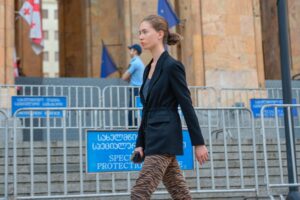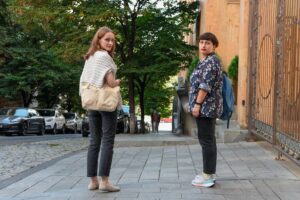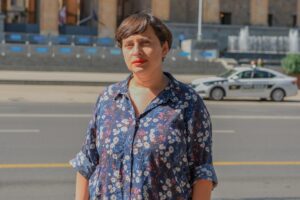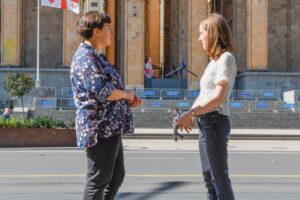
Double trouble: women journalists battling to do their job in Georgia
What do you associate with journalism? A person sitting in a newsroom? Someone filming people on the street for their opinions? Talking to the anchor from the studio? Or a reporter in a helmet and a flak jacket connecting from a hotspot? All of these are an everyday reality for journalists. But there are other things you need to know: the obstacles they encounter daily, the attacks and smear campaigns they need to repel, and how they sometimes have to fight for their survival.
It often happens that journalists are attacked for no reason, just because they are doing their job, asking questions, investigating subjects that some people are trying to conceal. Those attacks can be both verbal and physical. Smear campaigns are also used to discredit them, trying to mobilise public opinion against them with disinformation and manipulation.
These problems affect all journalists. But women journalists also face gender-based attacks. For example, in a study by the Media Development Fund (MDF) on Anti-Gender and Anti-LGBTQ Mobilisation in Georgia, we read that the most frequent victims of offensive language are women in the political opposition, women active in NGOs, western female politicians, and women journalists.
Another study by MDF, on Gender Disinformation, reports that women journalists often face slut-shaming attacks, a form of sexist hate speech that attacks women for their behaviour or appearance in relation to established sexual norms and perceptions.
Female journalists working for critical media like Mtavari Channel and TV Pirveli have borne the brunt of such attacks. For example, a photo of Mtavari reporter Dea Mamiseishvili wearing a T-shirt in support of jailed journalist Nika Gvaramia was edited to change the slogan on her t-shirt to “My Bra is Tight”, with the fake image then disseminated with sexist comments like “Freedom to Breasts”, “We don’t believe, show them”, and “Hi Boys! My Bra is Tight!”
Attacks on women also often question their intellectual capabilities, competence, and experience. From the 39 identified cases of this kind, the targets were mostly women politicians and women human rights defenders, but also journalists.
To find out more about he conditions and obstacles faced by women working in the Georgian media, we spoke to three women journalists: Natali Jakhutashvili from Mtavari TV Channel, Tamta Kakhaberidze from Netgazeti.ge and Khatia Ghoghoberidze, Chairperson of the Charter of Ethics Council and founder of Media April.
Natali Jakhutashvili has been working in Georgian media for many years. She says the media environment in the country is unsafe, and accuses the government of encouraging violence by its aggressive attitude and refusal to answer questions from critical media. She does not feel safe at work, and says that journalists now expect to be attacked.
When asked what it means to be a journalist in Georgia, she answers simply: “There’s always a risk you will face some kind of danger. We expect this at any time; because they do not like your worldview or your critical approach, you will face both physical and psychological abuse.”
Natali recalls how at an event last July, she came under verbal, sexist attack from a senior governing politician. “It’s very simple: he attacked me because he didn’t like my questions. In general, government representatives have zero tolerance for critical questions… Yet they have an obligation to answer all questions, no matter how sensitive or difficult these questions may be.”
The Charter of Journalistic Ethics came out with a statement condemning the incident: “It is important that government representatives understand the role of the media in a democratic state, care about the safety of journalists at media outlets, including critical media, and treat them appropriately. The Charter considers that aggression against media representatives is inadmissible and calls on the authorities to stop encouraging violence and using sexist and discriminatory language,” the statement read.
“It’s a fact that government officials want to intimidate critical journalists when they fight with them,” says Natali. “Their main objective is to keep the public in an informational vacuum, and they want journalists to be silent about sensitive topics. They attack us in a very aggressive way. They probably think this may force some journalists into self-censorship. But clearly, this will not happen. That’s why I’m not afraid; we’re used to it. This is a huge challenge in the country, but there is no way that I will leave my profession because of this,” Natali insists.
Tamta Kakhaberidze is currently a journalist for Netgazeti, having also worked at On.ge. She has also faced sexist attitudes while working as a journalist, but highlights in particular the patronising attitudes from men seeking to dismiss her as a “good girl” who shouldn’t be in such a job.
On February 23, 2021, Tamta was at the office of the National Movement, when special forces entered the building to arrest its leader Nika Melia.
“Everyone went to the upper floor, where Melia was. I was standing at the door that led to the top floor. I wanted to film the special forces as they came in. I was wearing a hat, and it was hard to tell from a distance whether I was a man or a woman. A special forces officer rushed to me, grabbed my shoulder violently, pushed me against the door, and when he saw that I was a woman, he pulled back and said, ‘Hey, it’s a girl, give way’.
“They forced me aside, but I heard them saying to be careful, as I was a girl. I kept repeating that I was a journalist, and I had to stay and shoot. They told me, ‘Look, you’ll be injured; we don’t want you to get sick; you are sick; you’re pale; please come this way.’ I told them I was fine, but they didn’t listen… I kept screaming, ‘I’m not a girl, I’m a journalist!’, and they kept saying, ‘Please, girl, go that way’,” Tamta recalls.
She also became the target of a gender-based attack on July 5 2021, when homophobic and violent groups tried to disrupt a Pride parade, attacking more than 50 journalists, one of whom, Lekso Lashkarava, died a few days later. Protesters were initially irritated by the fact that she was filming the events, then confronted her because of the rainbow sticker on her phone.
“I had arrived at Rustaveli in the morning; things were already heating up there. I turned on my camera, and I followed the crowd. When I passed Kashveti Cathedral, two people attacked me. They told me I was corrupting children.
“Seeing me with the camera was the first reason for aggression. In general, the fact that I was a journalist irritated them. Then they attacked me based on my gender, seeing me as a member or a supporter of the community and saying they would not allow me to pervert and defame,” Tamta recalls.
Later the same day, Tamta faced more gender discrimination. “A journalist from Mtavari TV Channel was preparing to go live. Several boys were standing next to him, insulting and threatening him. I was filming all this silently. One of them saw this and came towards me. I expected aggression, but he sat next to me and started to talk to other boys. They were saying, ‘Look at her! What a good girl she is. She is a beautiful girl and sits there alone quietly. I think she is a journalist too, but she is a good journalist’. They were comparing me to him because he argued with them, and I didn’t. They said, ‘Now she will turn off the phone, put it in her pocket, and leave.’ They didn’t display aggression, but they intimidated me with benevolence mixed with threats,” Tamta recalls.
The story did not end for Tamta that day. The prosecutor’s office recognised her as a victim in the July 5 case and summoned her to court as a witness.
“The defendants’ lawyers started asking me questions,” she says. “When I told them something, they laughed; they didn’t take my words seriously. They repeated my phrases and laughed again. They mocked me.
“Towards the end, they told me, ‘Looking at you, we believe you’re a good, honest girl. You wouldn’t have bad intentions; you just did or perceive things wrongly.’ They pretended to have a caring attitude, while dismissing everything I said,” Tamta recalls.
Khatia Ghoghoberidze is director of the Council of the Charter of Ethics. She says the media environment in Georgia has deteriorated in recent years, attacks against journalists go unpunished, while the government limits the right to peaceful expression.
“Cases of physical violence against journalists are becoming more frequent,” she said, adding that the Charter of Ethics had repeatedly called on the government to properly investigate all cases and not to encourage aggression against the media, including through rhetoric.
As a journalist, Khatia has made a huge contribution to informing society about women’s rights and needs.
“In general, it’s not easy to work as a journalist in Georgia, and over the years you may have to face many attacks, physical and verbal. Because of this, it can be difficult to recall whether a specific attack was because of my profession or my gender. But then you realise that yes, sometimes the attacks are based on gender.”
Khatia says sexist and misogynistic attitudes are widespread in society, including among politicians, and this has an impact on attitudes towards female journalists. She says that in most cases, attacks on female journalists start off with their profession and then move on to their gender.
“This doesn’t mean that male journalists are not insulted, but the attitude towards women is more prevalent. Certain attitudes are undeniably sexist, when people say: ‘See what you look like. Take a mirror and look at yourself. It’s a shame, you’re a lady after all’, or ‘I’m lucky to be surrounded by so many excited young girls’,” says Khatia.
She explains that ‘positive’ discrimination is also discrimination, often less painful but still demeaning and humiliating for many women.
“I don’t want my gender to be accentuated, either positively or negatively, when I am fulfilling my professional duties. When I am covering a story, I’m just a journalist.”
Khatia emphasises that the Charter condemns discrimination on any basis and tries to raise awareness among both media representatives and citizens.
“The Charter lobbies for the protection of journalists’ rights and the creation of a healthy and free media environment. We are always ready to help and consult media representatives when they suspect that they are the targets of discrimination,” she explains.
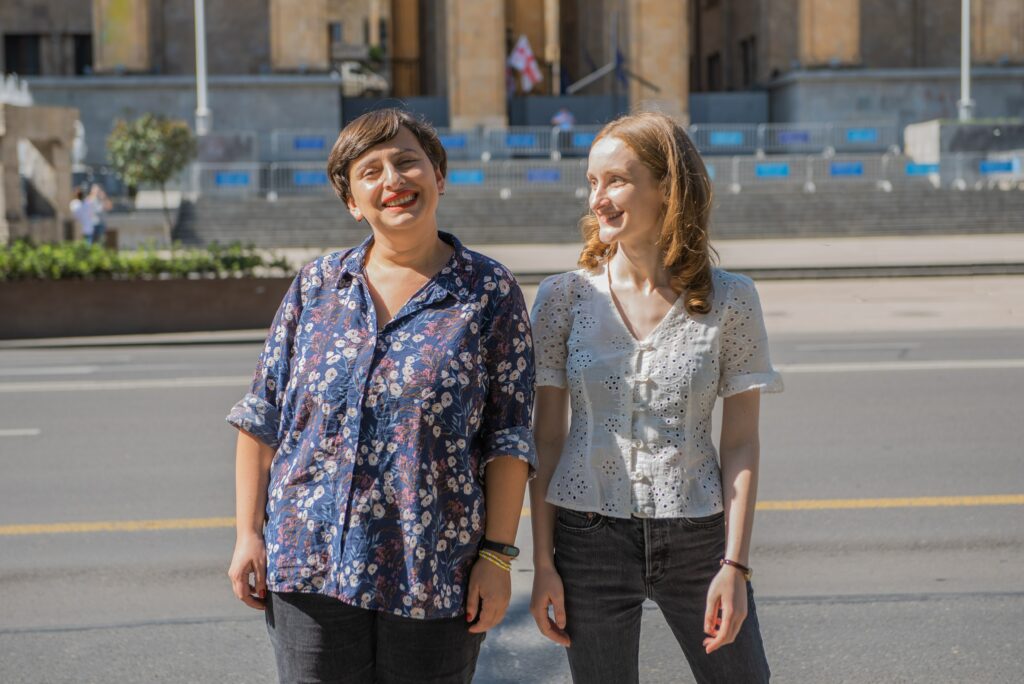
“I was also attacked many times while performing my professional duties. The first time, this happened at a homophobic rally in 2019. The protesters pushed me and forced me to drop my phone, calling me a propagandist and a provocateur. Instead of protecting me, the police advised me to leave the place ‘for the sake of my own safety’.”
“At that time, I didn’t think it was a gender-based attack,” she recalls. “It was only when I got home that I recalled that the homophobic groups gathered in front of the parliament had been focusing on my appearance and hair colour all day long. Sometimes with a whisper, sometimes with a shout, they reminded me that ‘with purple hair, I don’t look normal or like a woman’.
“Until July 5, we journalists thought that the press shirt and badges protected us, but the attack by violent groups made us realise this is not the case.”
During the recent protests against the so-called Russian law in March, Khatia also discovered she could be expelled from parliament, even though she was an accredited journalist with a special pass.
“Together with two colleagues, I was filming the campaign against so-called foreign agents from the parliament’s yard when a security service employee asked for my accreditation. I showed the pass issued by the parliament, and he promised to clarify the situation, but a few seconds later he grabbed me and forcefully threw me out of the legislative body without any explanation. In the same aggressive manner, they prevented me and two of my colleagues, who presented their official accreditation of the parliament, from fulfilling our professional duties.”
Such problems are not limited to Georgia. Journalists face obstacles everywhere in the world, as journalists, as women, and both. What is vital, is the hope for an effective response from the authorities. But in Georgia, “the organisers of the crimes of July 5 have still not been punished; nearly every day they announce new violence, but the government is silent,” says Khatia.
EUvsDisinfo has prepared a podcast where Mariam Nikuradze, a Georgian journalist and founder of OC Media, and Dalia Hasanbegovich, an Al Jazeera journalist in the Balkans, discuss the challenges and experiences of their countries regarding these issues.
Author: Tamuna Gegidze
The original article published in Georgian by On.ge
MOST READ
SEE ALSO

No, time is not on Russia‘s side
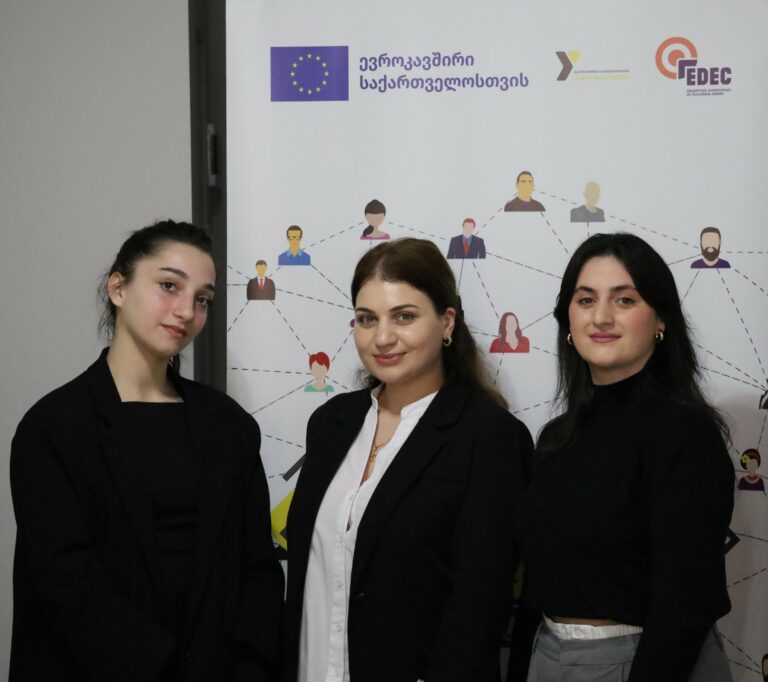
A hands-on approach to boost youth employment in Georgia
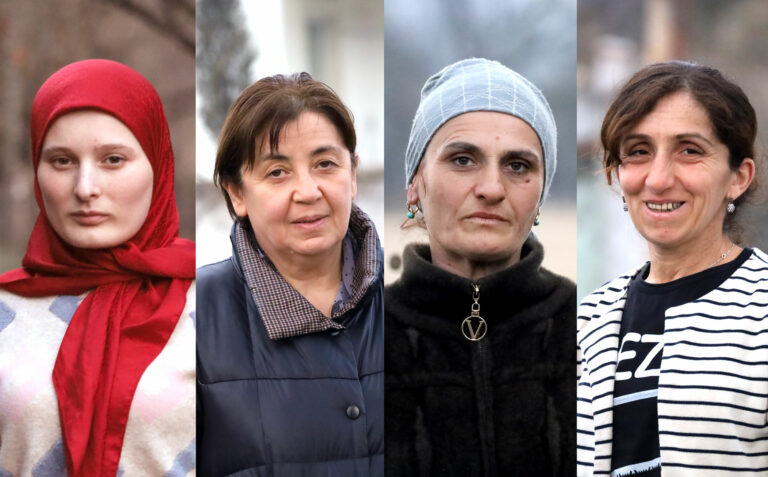
Taking health into their own hands: women’s empowerment in the remote villages of Georgia
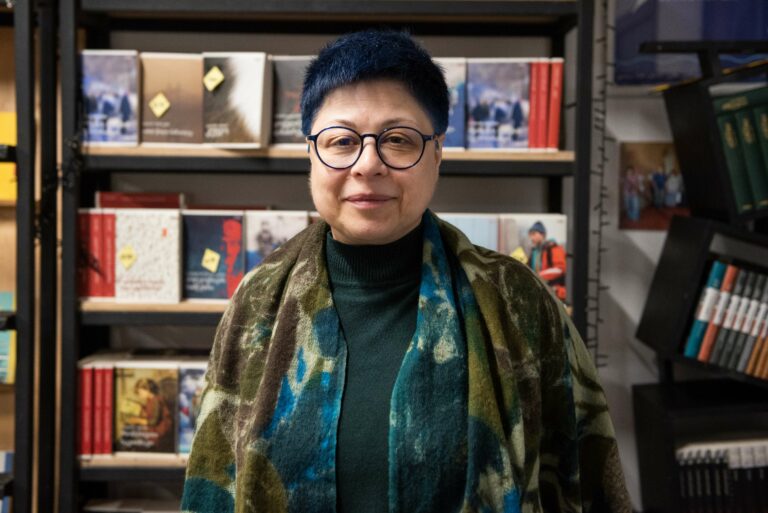
A woman publisher in a male-dominated industry – the path to a big dream

Be one step ahead of a hacker: check simple cybersecurity tips!
More campaign pages:
Interested in the latest news and opportunities?
This website is managed by the EU-funded Regional Communication Programme for the Eastern Neighbourhood ('EU NEIGHBOURS east’), which complements and supports the communication of the Delegations of the European Union in the Eastern partner countries, and works under the guidance of the European Commission’s Directorate-General for Neighbourhood Policy and Enlargement Negotiations, and the European External Action Service. EU NEIGHBOURS east is implemented by a GOPA PACE-led consortium. It is part of the larger Neighbourhood Communication Programme (2020-2024) for the EU's Eastern and Southern Neighbourhood, which also includes 'EU NEIGHBOURS south’ project that runs the EU Neighbours portal.

The information on this site is subject to a Disclaimer and Protection of personal data. © European Union,



